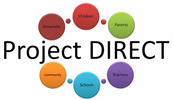Findings from many studies support the associations between aggression, peer relationships, and social skills. However, less research has been conducted on the relationship between aggressive behavior and social status. While aggressive youth are not always socially preferred (i.e., other youth don’t necessarily want to have them over for a visit or a sleepover), they are often perceived as socially powerful and popular. Additionally, some research has shown that aggressive youth may also have prosocial skills, such as leadership, which give them influence over their peers. However, there is a shortage of literature on the presence of this phenomenon among urban minority elementary aged youth.
This study aims to extend prior research on aggression, social status, and leadership within an urban, elementary aged (3rd and 4th grade) sample. Researchers collected data from a preliminary trial of a school-based universal aggression prevention program that was administered in a school district where 84% of the youth are below the national poverty line. Two hundred twenty-seven students from ten 3rd and 4th grade classrooms participated. The students completed a peer nomination procedure which allowed researchers to analyze the relationship between both relational and overt aggression with social preference, perceived popularity, and leadership.
The results demonstrated that both relational and overt aggression correlated with lower scores for social preference. Relational aggression includes behaviors like spreading rumors or excluding others; overt aggression includes behaviors like threatening or hitting. The association between aggression and popularity varied by gender. Overt aggression correlated with higher scores for popularity among boys, while relational aggression correlated with higher scores for popularity among girls. Overall there was a positive relationship between social status and aggression. Relational aggression in particular was associated with being viewed as a leader.
The observation of this trend among minority youth as early as 3rd grade has important implications for aggression prevention programs. If aggressive youth are viewed as leaders, they can influence the broader peer culture and create a climate where aggressive behavior is perpetuated and condoned. Aggression prevention programs can work to teach youth how to utilize their leadership abilities in a more positive way.
Waasdorp, T. E., Baker, C. N., Paskewich, B., & Leff, S. S. (2013). The association between forms of aggression, leadership, and social status among urban youth. Journal of Youth and Adolescence, 42, 263-274. pdf
This study aims to extend prior research on aggression, social status, and leadership within an urban, elementary aged (3rd and 4th grade) sample. Researchers collected data from a preliminary trial of a school-based universal aggression prevention program that was administered in a school district where 84% of the youth are below the national poverty line. Two hundred twenty-seven students from ten 3rd and 4th grade classrooms participated. The students completed a peer nomination procedure which allowed researchers to analyze the relationship between both relational and overt aggression with social preference, perceived popularity, and leadership.
The results demonstrated that both relational and overt aggression correlated with lower scores for social preference. Relational aggression includes behaviors like spreading rumors or excluding others; overt aggression includes behaviors like threatening or hitting. The association between aggression and popularity varied by gender. Overt aggression correlated with higher scores for popularity among boys, while relational aggression correlated with higher scores for popularity among girls. Overall there was a positive relationship between social status and aggression. Relational aggression in particular was associated with being viewed as a leader.
The observation of this trend among minority youth as early as 3rd grade has important implications for aggression prevention programs. If aggressive youth are viewed as leaders, they can influence the broader peer culture and create a climate where aggressive behavior is perpetuated and condoned. Aggression prevention programs can work to teach youth how to utilize their leadership abilities in a more positive way.
Waasdorp, T. E., Baker, C. N., Paskewich, B., & Leff, S. S. (2013). The association between forms of aggression, leadership, and social status among urban youth. Journal of Youth and Adolescence, 42, 263-274. pdf


 RSS Feed
RSS Feed